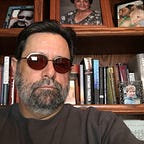Me & The Godfather Down in Fuzzytown
During my weeklong recovery from oral surgery — an altered state I have affectionately referred to as “Fuzzytown” — Mrs D and I watched the entire Godfather trilogy on three successive evenings. Of course I have seen all the movies more than once in the past, but never in such close temporal proximity. Admittedly, I was in the company of my new friend Mr Norco for the duration of these screenings, but nevertheless I have some thoughts…
One thing is clearly undeniable: the original Godfather movie (released in 1972) still holds up as one of the great films of our time. Marlin Brando’s portrayal of Vito Corleone is absolutely brilliant and magnetic, a model of complete inhabitation and revelation of character equal if not surpassing his astounding and seminal work as Stanley Kowalksi.
Also, the story arc of Michael Corleone — the inexorable unveiling of the gathering momentum of his coming of age as he is incrementally transformed from his family’s beacon of redemption to its shadowy emperor of murder — manages to approach the finest Shakespeare tragedies in both its insight into human frailty and its mythical qualities.
Godfather II is really about the extraordinary talent of the evolving Michael Corleone (and by extension all of humanity) for self delusion, compartmentalization and rationalization. And through the extensive backstory sequences of Robert De Niro as young Vito, this “second act” underlines one of the major themes of the trilogy — that of family history as inescapable and incontrovertible destiny. At the end of the movie, when Michael goes so far as to kill his own brother to preserve his power, we see Michael at something akin to an addict’s “rock bottom,” a place where absolutely any decision is possible… except the decision to face his own wrongs.
Godfather II is made somewhat choppy by the numerous time shifts and flashbacks, and I frankly think it’s been overrated simply on the strength of the young De Niro’s magnetic screen presence, and the audience’s understandable satisfaction in connecting De Niro on screen to Brando, whom we all recognize as his natural predecessor, both in terms of talent and intensity.
Godfather III has been much criticized for various reasons. Yes, it’s true that Sophia Coppola’s performance is wooden and amateur. Even this sofa jockey, watching under the influence, was wincing as some of her lines clunked out of the surroundsound like malformed Playdoh bricks. It’s also true that the great Robert Duvall’s absence is a significant disappointment. His performance as Tom Hagin, the Irish orphan adopted off the streets into the Corleone family, (never quite receiving the full acceptance he was quietly desperate for), was wonderfully understated and poignant throughout the first two films. And it’s true that the storyline of this film is perhaps not sufficiently compelling on its own. But frankly, the second movie does not stand on its own either.
However, seeing all three movies in quick succession and taking them as a whole, I think Godfather III is underrated as a third act to the overall story. What we see is an older, hollowed out Michael Corleone, physically and psychically exhausted from the Sisyphean task of preserving his power, his identity, and his internal sense of correctness. Publicly he is making one final show of claiming legitimacy, while privately he is confronting the likelihood that redemption is out of reach for a man of his crimes.
His one desperate plea (or play or ploy) is for simple forgiveness… and perhaps some semblance of peace… perhaps a truce or at least a stalemate with his past. Yet, Godfather III provides one of the most indelible lines of the entire trilogy when Michael stands in a kitchen after learning that all of his machinations are crumbling around him in betrayal and violence… then, with fists clenched and shoulders collapsing in defeat toward the very center of his being, he growls to the heavens, “Just when I thought I was out… they pull me back in.”
Just when I thought I was out… they pull me back in.
That one line sums up the futility of Michael’s struggle throughout the entire trilogy — the struggle against the momentum of his darkest possible destiny, the struggle against his coldest and most remote self. And the universal resonance of that moment is that it sums up our own struggles to overcome the weaknesses we all recognize in our darkest mirrors. In the end, there is nothing that Michael Corleone can do, no one he can pay, and no one he can murder to prevent his sins from becoming his legacy.
Perhaps God and his son are capable of forgiveness, but history does not offer such refuge. At the end of his story, we and Michael are left with only one inescapable reality: that each of us is capable of destroying our own soul at the smiling behest of our quietest desire.
Taken as a whole, the Godfather trilogy is one of the great literary experiences available in American film. That is why it has lived on as an important touchstone of our culture’s mindset for many years now. Michael’s journey taps into something that is timeless and specifically human; his story is not simply a morality play about power’s corruption, but a deeper exploration of the human desire to rise above our meanest impulses, the drive to be truly in charge of the history we make, and the dream to live out the love and justice we imagine we are capable of.
